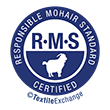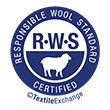- Sustainability
- Labels & certifications
Labels & certifications
Here’s what our labels stand for.
When our products have a label indicating a certified or licensed material, it means the main fabric contains at least 50 percent of the specified material. We only list one material* per product. This means that if a fabric consists of 60 percent organic cotton and 40 percent recycled polyester, only the certified cotton is listed. We genuinely aim to provide clear guidance for customers who want to make more sustainable choices.
Since 2020, all the cotton we use is either certified organic cotton or cotton sourced through the Better Cotton organization.
Since autumn 2024, all animal fibers we use are certified for animal welfare practices or certified recycled animal fibers.
*Our products containing animal fibers always include at least 50 percent of a certified animal fiber or a combination of multiple certified animal fibers that together make up at least 50 percent. In these cases, both materials are listed on the label.
Masters of FLAX FIBRE™ (formerly European Flax™)
Our Masters of FLAX FIBRE™ labelled garments contain at least 50% Masters of FLAX FIBRE™.
Read more about Masters of FLAX FIBRE™ here
FSC certified wood/paper/rubber
The Forest Stewardship Council® (FSC®) is a global, not-for-profit organization dedicated to the promotion of responsible forest management worldwide. FSC defines standards based on agreed principles for responsible forest stewardship that are supported by environmental, social and economic stakeholders.
Look for our FSC® certified products. Licens: FSC®-N003228.
To learn more, visit www.fsc.org.
LENZING™ ECOVERO™
The responsible production of LENZING™ ECOVERO™ fibers uses at least 50% less water and emits at least 50% less greenhouse gas (GHG) compared to generic viscose fibers, according to Higg MSI^, thereby saving precious resources for future generations.
^Results based on LCA standards (ISO 14040/44) and available via Higg MSI Version 3.9.1 (December 2024).
The wood used as raw material for all LENZING™ ECOVERO™ fibers is sourced from certified (FSC® or PEFC certification*) or controlled wood sources.
*FSC® (FSC-C041246) or PEFC (PEFC/06-33-92) certification.
LENZING™ and ECOVERO™ are trademarks of Lenzing AG.
Our LENZING™ ECOVERO™ labelled garments contains at least 50% LENZING™ ECOVERO™ in the main material.
LIVAECO BY BIRLA CELLULOSE™
A viscose quality made of Birla Cellulose fibers, which comes from certified responsible forestry. The material is produced in a closed system, where the water and solvents are reused. Our Livaeco by Birla Cellulose™ labelled products contains at least 50% of the fiber.
Read more about LIVAECO BY BIRLA CELLULOSE™.
Made with organic cotton – GOTS
The Global Organic Textile Standard (GOTS) is a global standard and certification for processing textiles made from organic fibres, which includes both social and environmental criteria. GOTS certified garments are always made from at least 70% organic materials.
Organic materials are natural fibres grown without the use of chemical pesticides, artificial fertilisers or genetically modified crops. The standard enables the traceability of certified material from the first processor to the final product.
To carry the GOTS ‘made with organic’ label grade, a textile product must contain a minimum of 70% certified organic fibres. The remaining portion of fibres must meet strict criteria per GOTS requirements.
Our GOTS certified products carry the logo together with our license number on the hangtag/packaging.
Made with organic cotton in-conversion – GOTS
The Global Organic Textile Standard (GOTS) is a global standard and certification for processing textiles made from organic fibres, which includes both social and environmental criteria. GOTS certified garments are always made from at least 70% organic materials.
Organic materials are natural fibres grown without the use of chemical pesticides, artificial fertilisers or genetically modified crops. The standard enables the traceability of certified material from the first processor to the final product.
'Organic in-conversion’ cotton is grown on an area of land that is being converted to organic farming. ‘In-conversion’ describes the process of transitioning from conventional to organic agriculture, and this process usually takes three years.
During that time, farmers implement organic agricultural methods, builds up soil health and only use fertilizers and pesticides that are allowed in organic farming. By buying 'Organic in-conversion’ cotton, Kappahl Group supports farmers on their journey to organic agriculture.
To carry the GOTS ‘made with organic’ label grade, a textile product must contain a minimum of 70% certified organic fibres. The remaining portion of fibres must meet strict criteria per GOTS requirements.
Our GOTS certified products carry the logo together with our license number on the hangtag/packaging.
Organic cotton
Organic cotton is grown entirely without chemical pesticides, artificial fertiliser or genetically modified crops, which results in better soil quality, greater biodiversity and balanced ecosystems. It is expensive and time consuming to convert agriculture to organic. Therefore, only a small part of all cotton production in the world is organic.
We do not use any conventional cotton in our products.
Our Organic Cotton-labelled garments contains at least 50% organic cotton, and we use Organic Content Standard (OCS) to keep track and verify the organic cotton fibers.
Organic cotton – GOTS
The Global Organic Textile Standard (GOTS) is a global standard and certification for processing textiles made from organic fibres, which includes both social and environmental criteria. GOTS certified garments are always made from at least 70% organic materials.
Organic materials are natural fibres grown without the use of chemical pesticides, artificial fertilisers or genetically modified crops. The standard enables the traceability of certified material from the field to the final product.
To carry the GOTS ‘organic’ label grade, a textile product must contain a minimum of 95% certified organic fibres. The remaining portion of fibres must meet strict criteria per GOTS requirements.
Our GOTS certified products carry the logo together with our license number on the hangtag/packaging.
Recycled polyamide
Recycled polyamide can be made from pre-consumer waste from the manufacturing industry or post-consumer products like old fishing nets or carpets that otherwise would be wasted. Wherever possible, we choose recycled polyamide rather than conventional polyamide.
Our Recycled Polyamid-labelled garments contains at least 50% recycled polyamide, and we use Global Recycled Standard (GRS) and Recycled Claim Standard (RCS) to keep track and verify the recycled content.
Recycled polyester
Recycled polyester can be made from post-consumer waste as plastic bottles or textile waste from products that reached its end of life, it can also be pre-consumer waste from productions like yarn waste during spinning or fabric cutting leftovers at the garment manufacturer. Wherever possible, we choose recycled polyester rather than conventional polyester.
Our Recycled Polyester-labelled garments contains at least 50 % recycled polyester, and we use Global Recycled Standard (GRS) and Recycled Claim Standard (RCS) to keep track and verify the recycled content.
Recycled plastic
Recycled plastic can be made from pre-consumer waste from the manufacturing industry or post-consumer products like old bottles or food containsers that otherwise would be wasted.
Wherever possible, we choose recycled plastic rather than conventional plastic. Our Recycled Plastic-labelled garments contains at least 50 % recycled plastic, and we use Global Recycled Standard (GRS) and Recycled Claim Standard (RCS) to keep track and verify the recycled content.
Rescued Fabrics
Often, design comes first, and materials second. But with Rescued Fabrics we’re doing the exact opposite.
What leftover fabrics might our suppliers have in their storage? How can we design garments or products to put those leftovers to use?
By using leftover materials from previous collections, we take care of valuable resources.
RMS certified mohair
Kappahl Group is certified to the Responsible Mohair Standard. All of our mohair fiber is independently certified to the Responsible Mohair Standard, certified by Control Union, 1209888.
The Responsible Mohair Standard (RMS) describes and certifies animal welfare and land management practices in mohair production and tracks the certified material from farm to final product.
Our RMS labelled products contains at least 50% RMS certified mohair fiber in main fabric (or a combination of RWS/RMS/RAS certified fibers that together reach at least 50%).
Read more about Responsible Mohair Standard.

RWS certified wool
Kappahl Group is certified to the Responsible Wool Standard. All of our wool fiber is independently certified to the Responsible Wool Standard, certified by Control Union, 1209888.
The Responsible Wool Standard (RWS) describes and certifies animal welfare and land management practices in wool production and tracks the certified material from farm to final product.
Our RWS labelled products contains at least 50% RWS certified mohair fiber in main fabric (or a combination of RWS/RMS/RAS certified fibers that together reach at least 50%).
We have phased out all conventional wool in our products, and use only wool that are RWS certified, recycled or organic.
Read more about Responsible Wool Standard.

TENCEL™ Lyocell
The responsible production of TENCEL™ Lyocell fibers uses at least 50% less water and emits at least 50% less greenhouse gas (GHG) compared to generic lyocell fibers, according to Higg MSI^, thereby saving precious resources for future generations.
^Results based on LCA standards (ISO 14040/44) and available via Higg MSI (Version 3.8).
TENCEL™ Lyocell fibers are produced in a closed loop process which recovers 99.8% of the solvent – resulting in close-to-zero wastage.
TENCEL™ is a trademark of Lenzing AG.
Our TENCEL™ Lyocell labelled garments contains at least 50% TENCEL™ Lyocell in the main material.